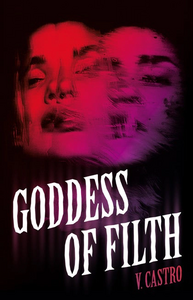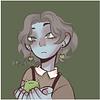Take a photo of a barcode or cover
dark
funny
medium-paced
Feminine rage meets possession of an entity.
this really did not hit for me at all even though i wanted it to. really truly feels like the climax was written first and the rest of the book was written around it, its so disjointed and abrupt. the non-climax portions are so awkwardly written and like.... i dont want to say irrelevant but theres weird amounts of focus put on things that do not matter That much. probably shouldve gone through a few more drafts.
staccato writing that made it hard to feel or relate to anything throughout the story. not a well balanced mix of "horror" and "erotica".
dark
medium-paced
Excellent feminist horror centering friendship, sexuality, and Chicana characters who decide they're not going to take anymore shit. Highly recommend.
Oh, man. Where to start with this one? I had such high expectations for this novella when I first read about the premise. I was so excited to read a sort of Mexican spin on The Craft. I really wanted a novel playing up Mexican folklore as well as the occult, which is what the book led me to believe this would be. It was also printed by a very pro-feminism publisher, so I thought I was in for a really fun ride. I was very wrong.
I think the biggest problem with Goddess of Filth is that V. Castro wanted to write a scary story that symbolized a coming of age metaphor, but missed pretty much every mark she needed to hit. On top of that, she pushed aside the more interesting factors of her story, like the occult practices, in order to focus more on the premise those practices set up. That sounds a little confusing, but let me explain. Everything that happens in this novella is the result of a séance gone wrong, however, even though this is arguably the most pivotal scene in the entire novel, it has no build up whatsoever (it's the opening scene) and takes place so quickly and so poorly that I was stunned these girls were able to summon anything at all. Then, what comes forth from this séance is what I believe to function as V. Castro's big metaphor for growing up, but when taken at face value translates to something completely polar to her initial intent. In other words, allowing an ancient being to possess you is supposed to represent a main character coming into herself, but at the end of the day it just reads as if a woman can only reach her full potential if she gives someone else control of her body. Which is basically the most anti-feminist concept out there. Like it goes against all the principals women have been fighting for over the last several centuries.
So that's the major root of the issue with this novella, however, there's more. What's the first thing you would do if you thought your best friend was possessed by a demon? Some people may go to a doctor, others may seek out a priest, but I don't think anyone in their right mind would say "Let's sneak this 19 year old girl into a 21+ night club!" Not only do the characters in Goddess of Filth do this, but then they lose their friend and she ends up in a sleazy situation with a predatory guy. Just where was the common sense in all of this?
There was just so much blatantly wrong with this novel and so many more scenes of main characters making stupid decisions that made no logical sense, but I'll overlook that in favor of speaking about the absurd, unnecessary side plot that takes place during the majority of this story. Just about every scene with that scumbag priest was a joke. It felt so forced and unhinged and the big reveal about him was gross and cliché. In fact this storyline hinged so closely on a stereotypical caricature that it actually made me start paying more attention to the stereotypes Castro implemented in her novella. Constantly she has main characters saying they are more than a stereotype, and constantly she introduces characters who are literally defined by a negative cultural interpretation. Every time I met a new character I would roll my eyes at how undeveloped they were.
I wanted to enjoy this novella. I had high hopes for it, but it strayed away from all of the major topics that initially made this storyline intriguing. There was a really interesting concept buried deep inside this tale, but it was never dug up and fleshed out enough to carry this story beyond a low 2-star rating.
I think the biggest problem with Goddess of Filth is that V. Castro wanted to write a scary story that symbolized a coming of age metaphor, but missed pretty much every mark she needed to hit. On top of that, she pushed aside the more interesting factors of her story, like the occult practices, in order to focus more on the premise those practices set up. That sounds a little confusing, but let me explain. Everything that happens in this novella is the result of a séance gone wrong, however, even though this is arguably the most pivotal scene in the entire novel, it has no build up whatsoever (it's the opening scene) and takes place so quickly and so poorly that I was stunned these girls were able to summon anything at all. Then, what comes forth from this séance is what I believe to function as V. Castro's big metaphor for growing up, but when taken at face value translates to something completely polar to her initial intent. In other words, allowing an ancient being to possess you is supposed to represent a main character coming into herself, but at the end of the day it just reads as if a woman can only reach her full potential if she gives someone else control of her body. Which is basically the most anti-feminist concept out there. Like it goes against all the principals women have been fighting for over the last several centuries.
So that's the major root of the issue with this novella, however, there's more. What's the first thing you would do if you thought your best friend was possessed by a demon? Some people may go to a doctor, others may seek out a priest, but I don't think anyone in their right mind would say "Let's sneak this 19 year old girl into a 21+ night club!" Not only do the characters in Goddess of Filth do this, but then they lose their friend and she ends up in a sleazy situation with a predatory guy. Just where was the common sense in all of this?
There was just so much blatantly wrong with this novel and so many more scenes of main characters making stupid decisions that made no logical sense, but I'll overlook that in favor of speaking about the absurd, unnecessary side plot that takes place during the majority of this story. Just about every scene with that scumbag priest was a joke. It felt so forced and unhinged and the big reveal about him was gross and cliché. In fact this storyline hinged so closely on a stereotypical caricature that it actually made me start paying more attention to the stereotypes Castro implemented in her novella. Constantly she has main characters saying they are more than a stereotype, and constantly she introduces characters who are literally defined by a negative cultural interpretation. Every time I met a new character I would roll my eyes at how undeveloped they were.
I wanted to enjoy this novella. I had high hopes for it, but it strayed away from all of the major topics that initially made this storyline intriguing. There was a really interesting concept buried deep inside this tale, but it was never dug up and fleshed out enough to carry this story beyond a low 2-star rating.
dark
emotional
tense
fast-paced
Plot or Character Driven:
A mix
Strong character development:
Yes
Loveable characters:
Yes
Diverse cast of characters:
Yes
Flaws of characters a main focus:
No
dark
tense
fast-paced
Plot or Character Driven:
A mix
Strong character development:
Yes
Loveable characters:
Yes
Diverse cast of characters:
No
Flaws of characters a main focus:
Complicated
Loved this book! Although it was short, I loved the time spent with these characters. These young women felt so relatable and real. A different take on a possession story. Feminist, thrilling, fun, with some spooky moments and some bad guys that you can’t wait to see meet the Goddess.
dark
emotional
tense
fast-paced
Plot or Character Driven:
N/A
Strong character development:
Yes
Loveable characters:
Yes
Diverse cast of characters:
Yes
Flaws of characters a main focus:
No
Like all good coming of age stories, there has to be a level of messiness while finding out who you are. This novella really hit it for me. Being a woman in this world is not easy, let alone a woman of colour. There are so many stereotypes out there that hold us back from our true potentials. Not only has the patriarchy in the last 1000 years or so really trapped women into a confined ‘put on a shelf to be admired’ or ‘discarded to the attic because we’ve lost our shine’ category, but it has also taken away the strength and power of female mythological beings. We’ve only had the weaker more ‘demure’ idols for us to aspire to.
Not only does this story touch on the fact that women are strong, and messy, and at times unsavoury. It also addresses societies double standards of being able to pull oneself up from their bootstraps. Which we all now know to be utter trite and only for those of privilege. Though this novella may be short, it shows the struggles of how young women of colour have to traverse the stereotypes of coming from a far less privileged part of society. You’ll either become the narrative they say you are or overcompensate and suppress your wants and needs to achieve the goal of breaking free from these constraints.
I found the ending a bit too idealistic for my liking, life doesn’t always work out that way for us. However, I understand the reasoning behind it. We need hope. Hope that we can break free from the bounds of society and pave a new way for all women to be, to be the version of themselves that they are, not what is expected.
Not only does this story touch on the fact that women are strong, and messy, and at times unsavoury. It also addresses societies double standards of being able to pull oneself up from their bootstraps. Which we all now know to be utter trite and only for those of privilege. Though this novella may be short, it shows the struggles of how young women of colour have to traverse the stereotypes of coming from a far less privileged part of society. You’ll either become the narrative they say you are or overcompensate and suppress your wants and needs to achieve the goal of breaking free from these constraints.
I found the ending a bit too idealistic for my liking, life doesn’t always work out that way for us. However, I understand the reasoning behind it. We need hope. Hope that we can break free from the bounds of society and pave a new way for all women to be, to be the version of themselves that they are, not what is expected.





